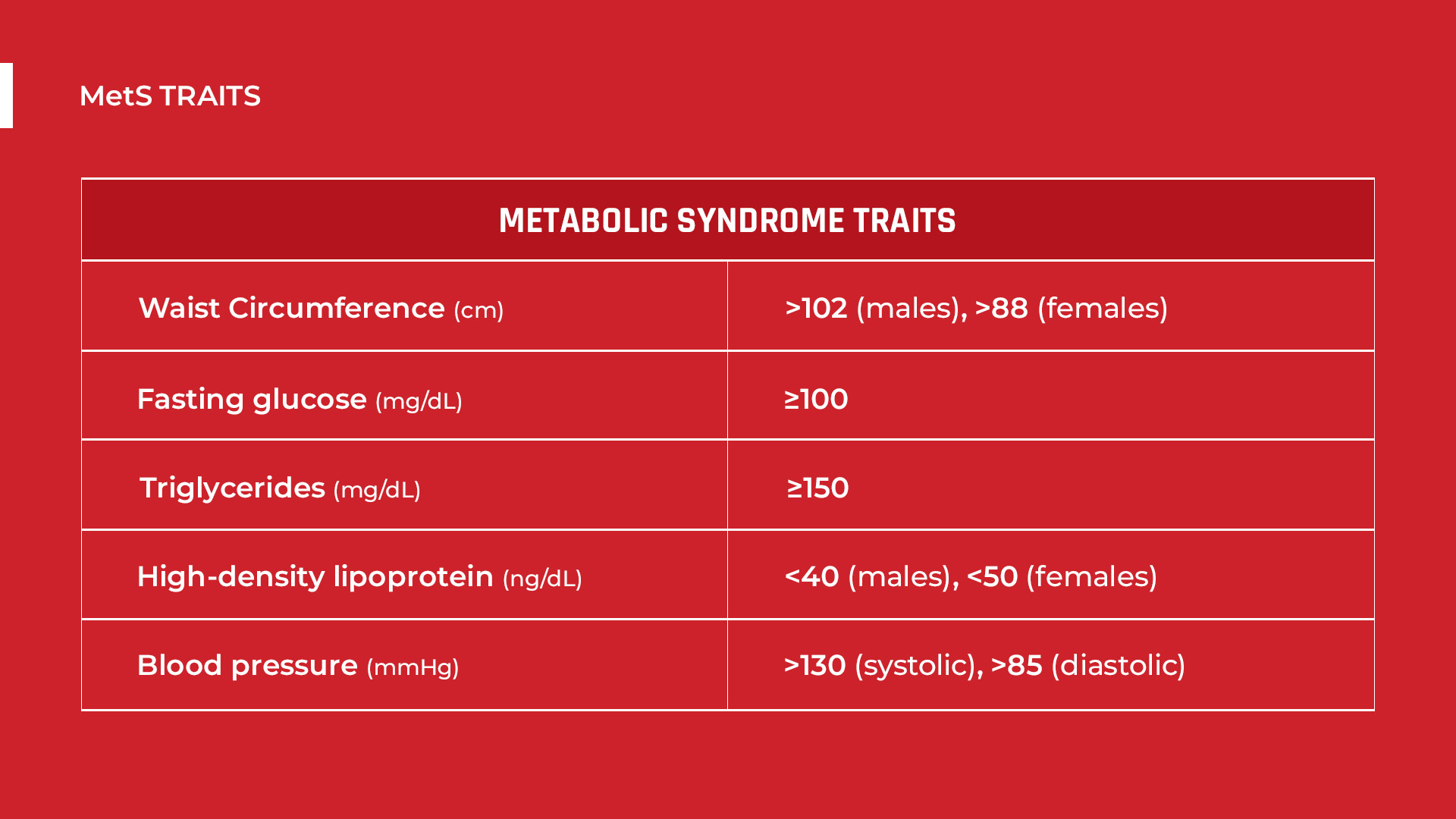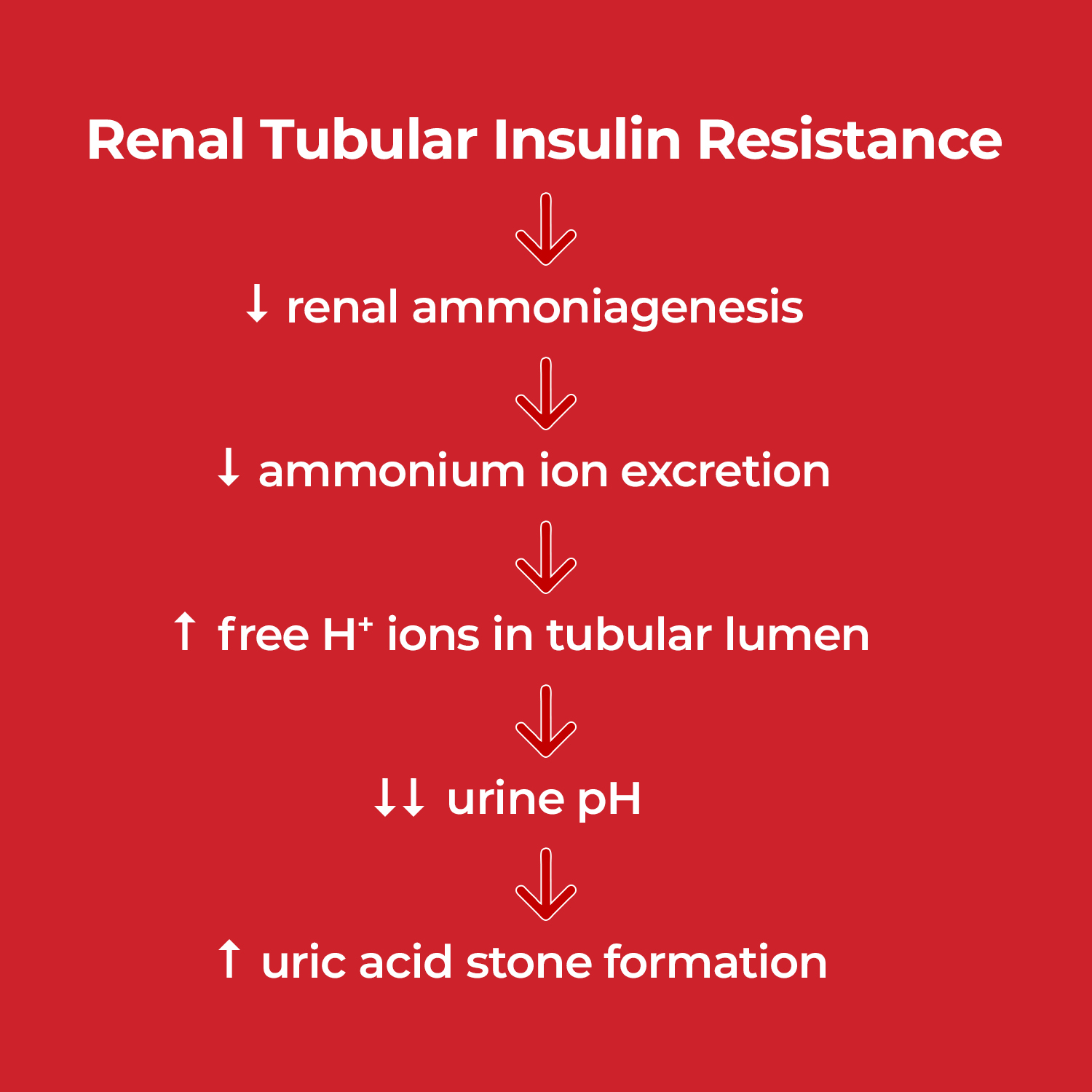Published: April 7, 2024 | 1 min read
Metabolic Syndrome and Insulin Resistance Impact on Kidney Stones
ARTICLE SHORTCUTS
- WHAT IS METABOLIC SYNDROME?
- WHAT IS INSULIN RESISTANCE?
- HOW DO METABOLIC SYNDROME AND INSULIN RESISTANCE RELATE TO KIDNEY STONES?
- HOW TO FIX YOUR METABOLIC HEALTH?
When it comes to uric acid (UA) stone formation, uric acid gets all the blame. However, let us tell you a little secret: It’s actually acidic urine that causes the trouble. And you won’t hear this from your doctor.
Now, what brings that extra acidity to your urine?
Here comes another misleading answer from Western medicine – a high-protein diet. Yes, it’s totally misleading. A high-protein diet will not cause you acidic urine. The real culprits nobody talks about are metabolic syndrome and insulin resistance.
WHAT IS METABOLIC SYNDROME?
Metabolic syndrome is a cluster of risk factors that raise your chances of getting heart issues, type 2 diabetes, and other health troubles. Watch out for any of these five traits:
- Abdominal obesity: In men, this means a waist circumference greater than 40 inches (102 cm), and in women, greater than 35 inches (88 cm)
- High blood pressure, or hypertension: This happens when your blood pressure is consistently above 130/85
- High blood sugar: This is when fasting blood sugar hits 100 mg/dL or more
- High triglyceride levels: When your triglyceride levels hit 150 mg/dL or more
- Low in “good” cholesterol (HDL): When HDL cholesterol dips below 40 mg/dL in men and 50 mg/dL for women

WHAT IS INSULIN RESISTANCE?
Insulin resistance, on the other hand, is a condition where the cells in your body do not respond effectively to the hormone insulin. Insulin is produced by the pancreas (a pea-sized gland in the neck) and is crucial in regulating blood sugar (glucose) levels. Excess body fat, especially abdominal (visceral) fat, is a major contributor to insulin resistance. Fat cells release adipokines (signaling molecules), which can interfere with insulin signaling in other cells.
Think of insulin as a key that unlocks your cells’ doors to let sugar (glucose) inside for energy. Now, imagine the keyholes getting a bit rusty, so the doors won’t open easily. That is what it’s like to have insulin resistance. Your cells don’t let insulin in. So, your body needs to produce extra insulin to try to open those doors. This results in higher blood sugar levels, which isn’t good. Over time, this can lead to health issues like type 2 diabetes.
Typically, insulin resistance is recognized when you have pre-diabetes traits.
- Hemoglobin test (A1C) – 5.7% to 6.4%
- Fasting plasma glucose (FPG) – 100 to 125 mg/dL
- Oral glucose tolerance test (OGTT) – 140 to 199 mg/dL
Both metabolic syndrome and insulin resistance will increase your chances of forming kidney stones, which we will discuss in the following sections.
HOW DO METABOLIC SYNDROME AND INSULIN RESISTANCE RELATE TO KIDNEY STONES?
According to studies, the more metabolic syndrome traits you have, the higher your chance of kidney stones. It’s like a ladder – from 3% if you’ve got none of the traits, up to 7.5% with three traits, and 9.8% if you’ve got all five traits.
Let’s see how each trait relates to kidney stones.
Obesity
In a study involving 5000 kidney stone-formers, researchers found an inverse correlation between body weight and urine pH. Meaning the heavier a person gets, the lower the urine pH (acidic). This is a disaster because uric acid kidney stones thrive in an acidic urine environment (<5.5), even when uric acid levels are normal.
Sadly, more than 1 billion people have obesity worldwide—650 million adults, 340 million adolescents, and 39 million children.
Hypertension
Among all the five traits, hypertension was found to increase stone risk the most. Researchers found this after examining data from 34,895 individuals with metabolic syndrome and kidney stones. Crazy as it may sound, but if you’re dealing with high blood pressure (hypertension), your chance of getting kidney stones is even higher than if you’ve got the whole trait package.
According to studies, around 1.3 billion people have hypertension worldwide.
High blood sugar and insulin resistance
When blood sugar levels are high (fasting glucose over 100mg), ammonium production in your kidneys may decrease. Ammonium is an alkaline ion, so reduced levels can lead to acidic urine. This is also the exact mechanism among people with insulin resistance.
In fact, the same study involving 5000 stone-formers found that 1/3 of pure UA stone-formers are diabetic. Surprisingly, none of the calcium-oxalate stone-formers in this study are diagnosed with diabetes. This proves the positive connection between high blood sugar levels and increased UA stone risk.
Unfortunately, according to the Centers for Disease Control and Prevention (CDC), 37.3 million adults are dealing with diabetes, and 96 million (more than one-third of adults in the U.S.) have pre-diabetes. And since insulin resistance is a step before both of these, more people could be dealing with this issue than reported.

Dyslipidemia
High triglyceride (most common body fat), high “LDL” (bad cholesterol), and low “HDL” (good cholesterol) levels are often referred to as dyslipidemia. To explain simply, dyslipidemia is like a traffic jam of fats in your blood vessels. It happens when fats are imbalanced in your blood, leading to clogged arteries.
Like hypertension, dyslipidemia may be a risk factor for many stone types. But notably, the UA stone prevalence among people with this condition is about 12%.
Sadly, around 83 million people (25%) in the US alone have high triglyceride levels. And shockingly, 50% of US adults have elevated “bad” cholesterol levels (LDL).
HOW TO FIX YOUR METABOLIC HEALTH?
Diet plays the biggest role in all this metabolic drama. That’s why we must look closely at what foods we eat daily. Western medicine always says that we should cut down on protein and eat more veggies to prevent chronic diseases. However, this is a total contradiction. In fact, the more you eat plant-based, the more you cause havoc in your gut. Plants are rich in linoleic acid (an omega-6 fatty acid). Excessive omega-6 intake is the primary cause of impaired metabolism.
Plant-based diets may also lead to excess sugar and carbohydrate consumption. This increases your risk of obesity and may impede the body’s insulin signaling.
So, if you want someone to help you cut through the clutter and start an effective diet plan. If you want to take that journey with us, jump into our Coaching Program today because we are dedicated to helping you succeed.
REFERENCES
- Kidney Stones Linked to Metabolic Syndrome
- Metabolic syndrome, obesity and kidney stones
- Role of insulin resistance in uric acid nephrolithiasis
- The influence of metabolic syndrome and its components on the development of nephrolithiasis
- The metabolic syndrome and uric acid nephrolithiasis: Novel features of renal manifestation of insulin resistance

Comments or questions?
Responses